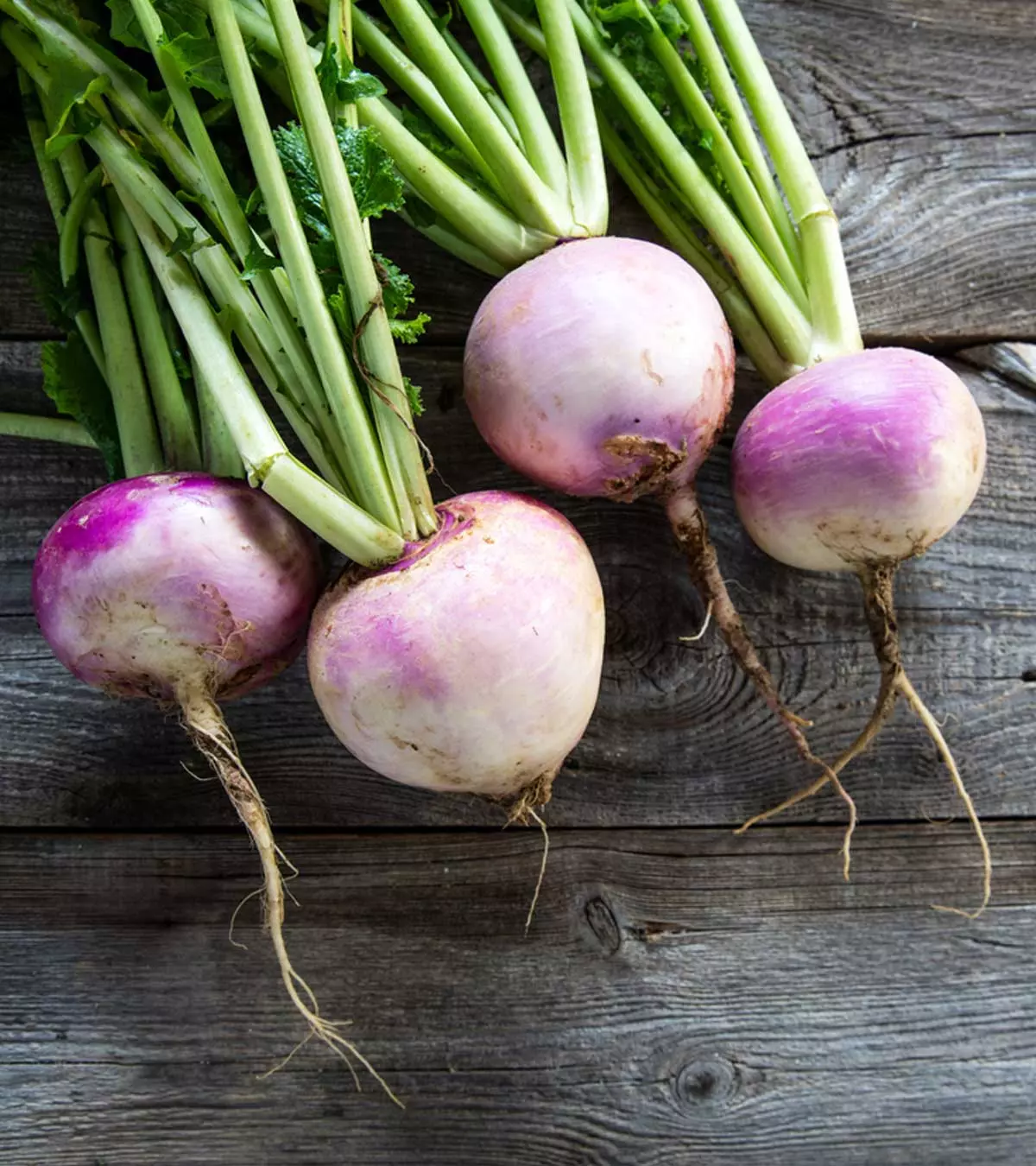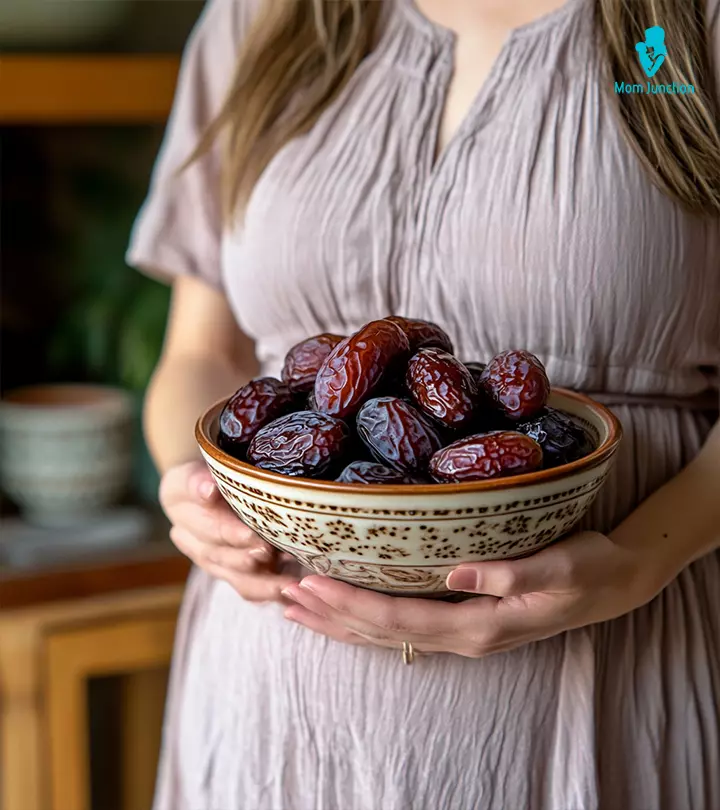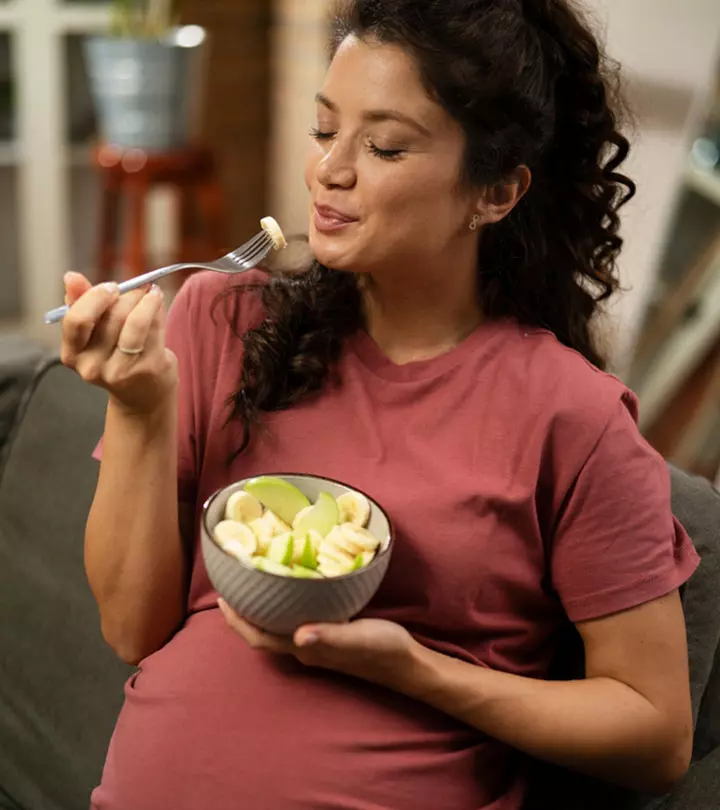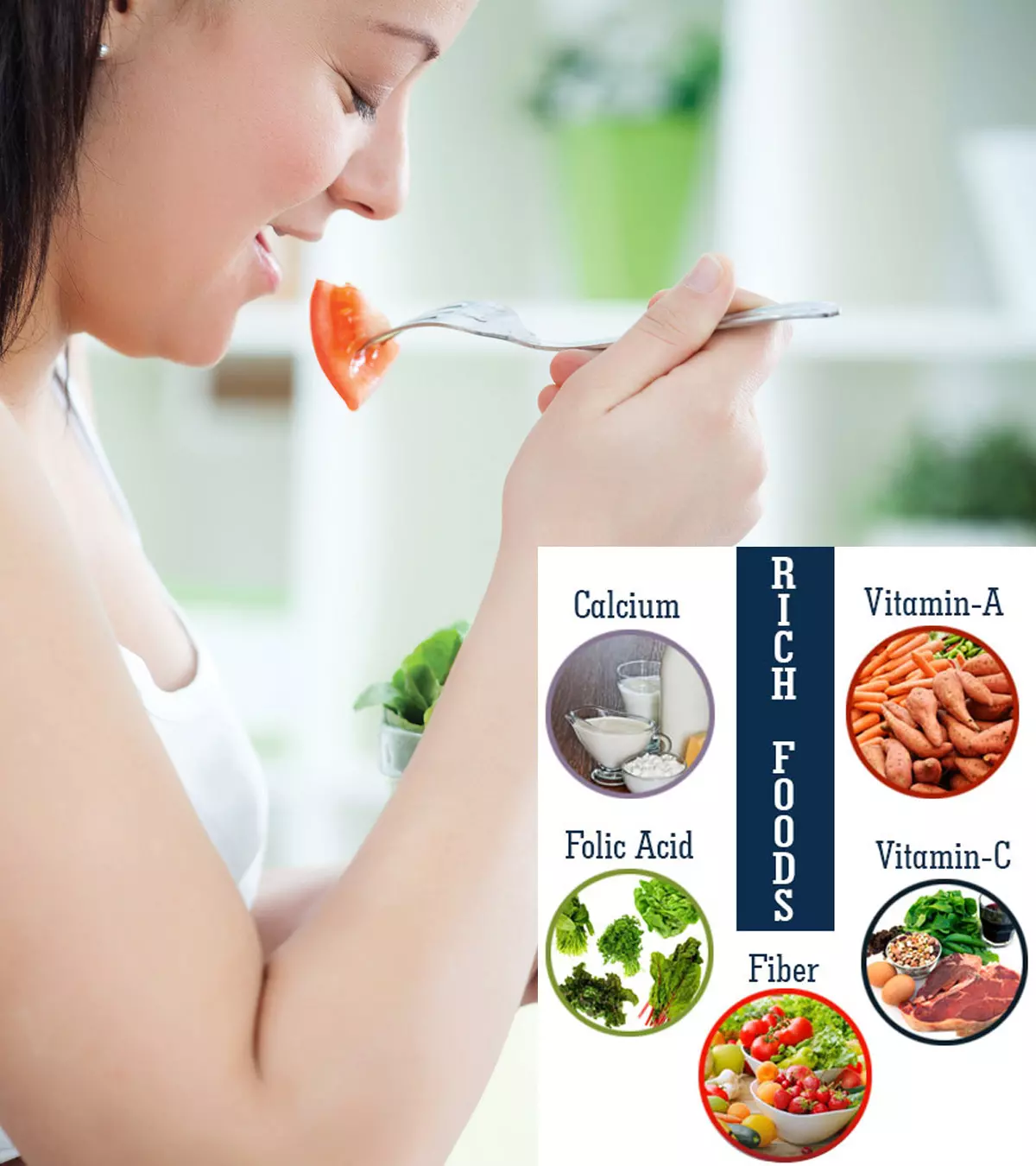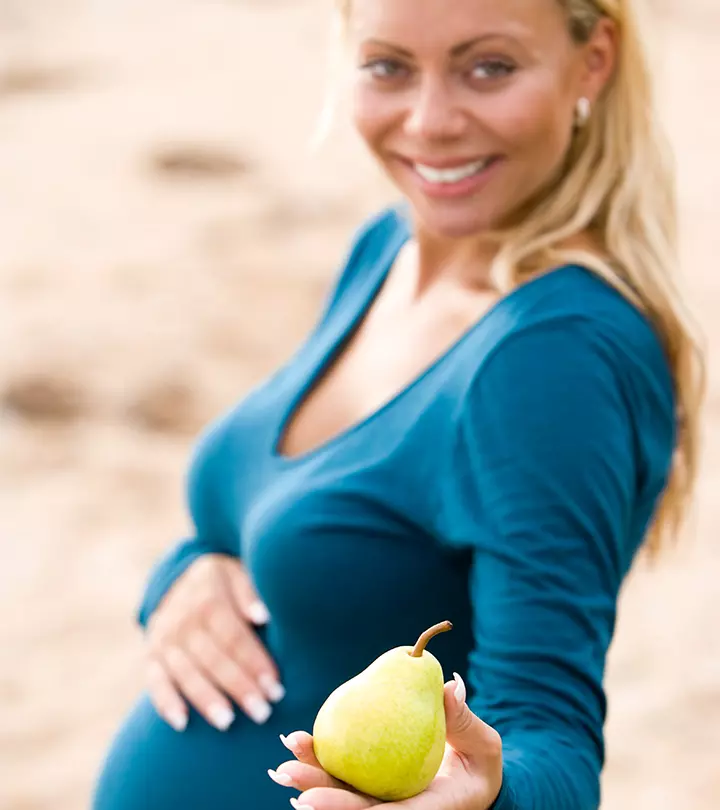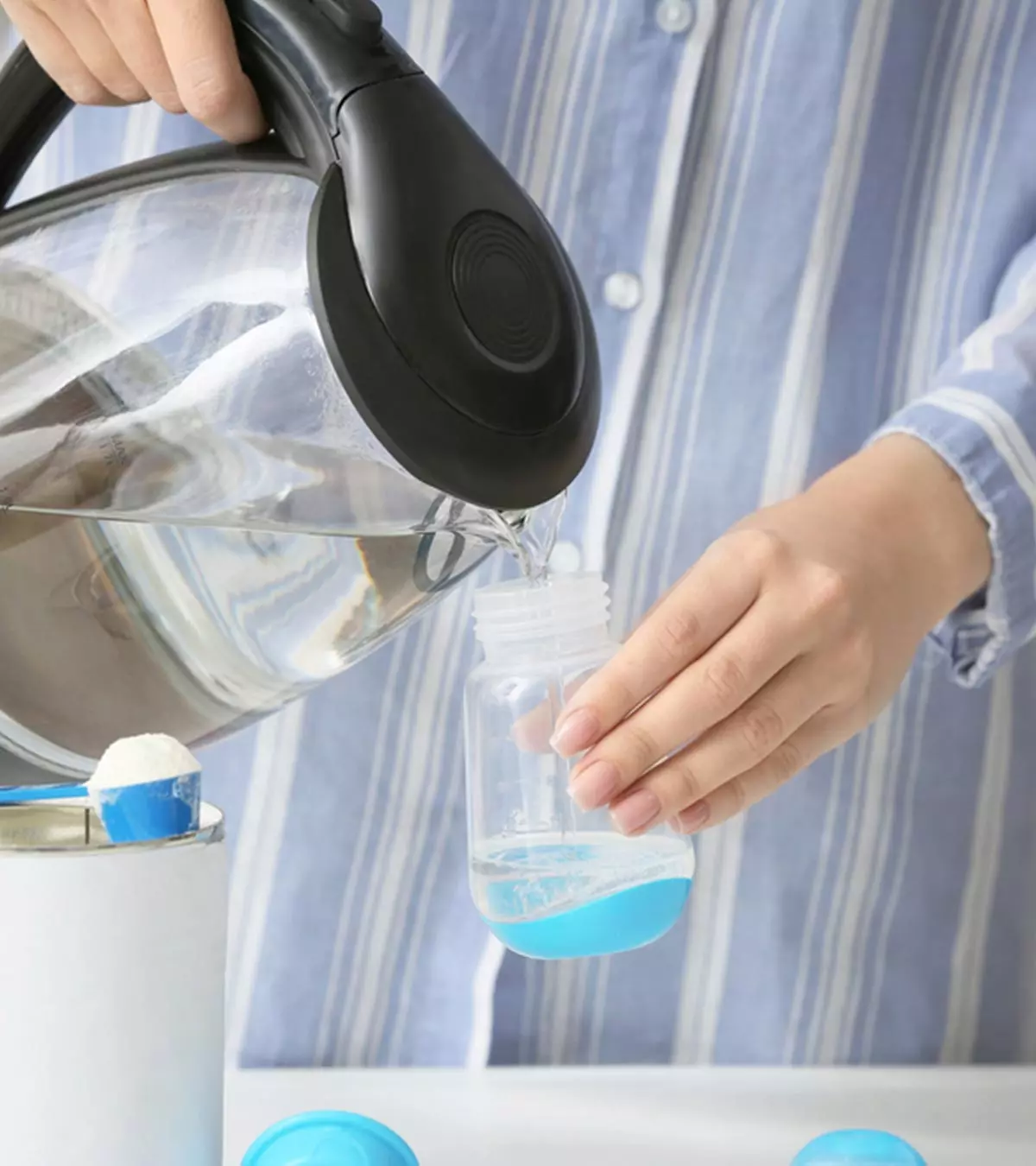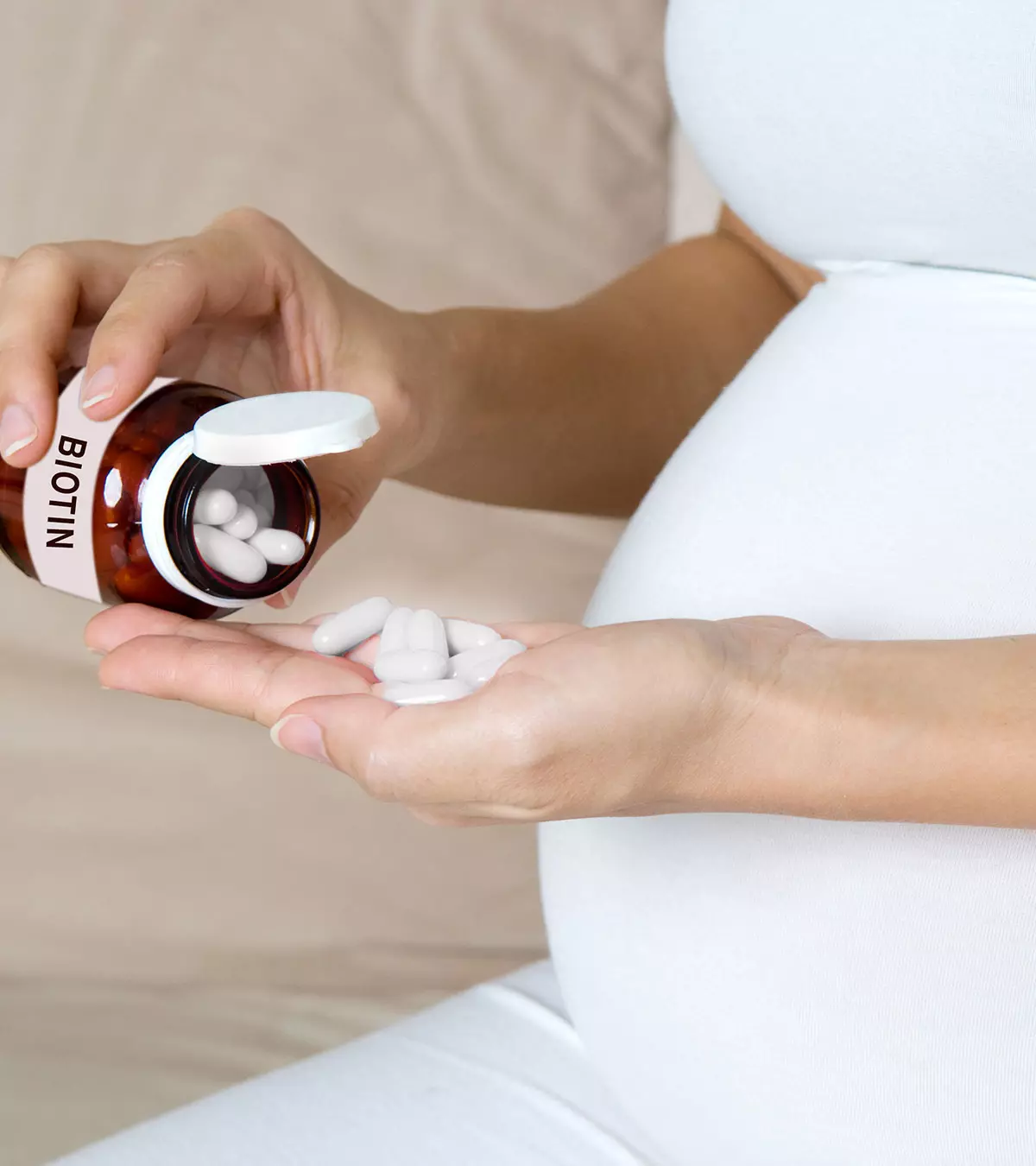
Image : Shutterstock
Your body requires different nutrients during pregnancy for the proper growth of the fetus. Biotin is a nutrient from the vitamin B complex category and has several health benefits. The deficiency of biotin during pregnancy may negatively impact fetal growth, making its inclusion essential in your pregnancy diet.

Maintaining a balanced diet allows for the acquisition of various nutrients necessary for proper nutrition. However, the requirement for some specific nutrients increases when you are pregnant. Therefore, you may need to include their food sources in your diet or obtain them through dietary supplements prescribed by a doctor. However, you should not take dietary supplements without first checking with your healthcare provider.
Continue reading this post to learn about the importance of biotin for pregnant women and different food sources rich in this nutrient.
Key Pointers
- Biotin is a B-vitamin that plays a crucial role in cell growth and metabolism.
- Biotin supplements are effective in treating its deficiency among pregnant women.
- Lack of biotin during pregnancy may cause fatigue, poor appetite, insomnia, and depression.
- Grains, vegetables, dairy products, eggs, meat, and fish are key sources of biotin that can help prevent biotin deficiency when added to a diet.
- It is important to consult a doctor to determine the best dose and source of biotin, considering its potential risks and interactions with other medications.
Can You Take Biotin While Pregnant?

Biotin, also known as vitamin H, belongs to the B complex group of vitamins. B vitamins are necessary for the body to convert food into energy, and they also play several important functions that help maintain the overall health of the body (1). Biotin during pregnancy can supplement the vitamin B deficiency.
A deficiency of this important vitamin can lead to the development of rashes, hair loss, hallucinationsiA vivid perception in the absence of external stimulus. as well as depression. It is, therefore, important to keep up with the intake of this crucial vitamin, particularly during pregnancy (2).
Why Is Biotin Needed During Pregnancy?
Biotin, just like other vitamins, is needed for the proper growth and development of the fetus. It was earlier believed that the deficiency of this vitamin is quite rare, but now, it has been found that pregnant women tend to be deficient in it.
Biotin participates in vital metabolic processes in humans, including gluconeogenesis, fatty acid synthesis, and amino acid breakdown, by serving as a prosthetic group for enzymes involved in energy metabolism (3).
Maternal health can be at risk due to biotin deficiency, which generally increases the likelihood of various health conditions and even birth defects during pregnancy, making it one of the most essential vitamins (4).
 Point to ponder
Point to ponderBiotin Deficiency During Pregnancy
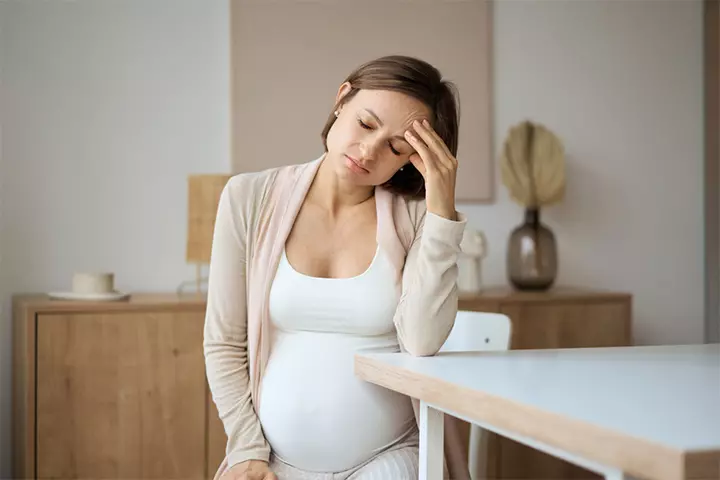
According to the National Institutes of Health, pregnant women must take in at least 30 mcg of biotin on a daily basis (2). Just like iron and folates like folic acid, biotin also makes for a crucial nutrient needed during pregnancy. In fact, a lot of women also tend to be deficient in this important vitamin during pregnancy because the body breaks down biotin more quickly during this period.
 Be watchful
Be watchfulThe Linus Pauling Institute states that around ⅓ to ½ of pregnant women are deficient in biotin, and this deficiency most commonly occurs during the late pregnancy (5).
A deficiency of biotin is linked to several health problems including:
- Poor hair and nail health
- Increased risk of seborrheic dermatitisiA common skin disease in children that causes dandruff, scaly patches, and inflamed skin on the body.
- Diabetes
- Cleft Palate/LipsiA type of congenital disability that results in underdeveloped lips or mouth. – A type of congenital disability that results in underdeveloped lips or mouth.
- Fatigue
- Reduced appetite
- Depression (6)
When it comes to pregnancy, biotin deficiency may also lead to birth defects. It has been found that a deficiency of this crucial vitamin may lead to birth defects in animals, particularly conditions such as skeletal deformitiesiAbnormality in the size, shape, growth, or alignment of the bones . , cleft palate, cleft lip, etc (7).
Best Food Sources Of Biotin
Biotin and pregnancy go together for good health. The best way to ensure you are not deficient in biotin and also support your overall nutritional needs during pregnancy is to add more biotin-rich foods to your diet. Some common foods that are rich in this vitamin include:
- Grains and nuts: Whole grain products and nuts such as walnuts, pecans, almonds and peanuts turn out to be good sources of biotin.
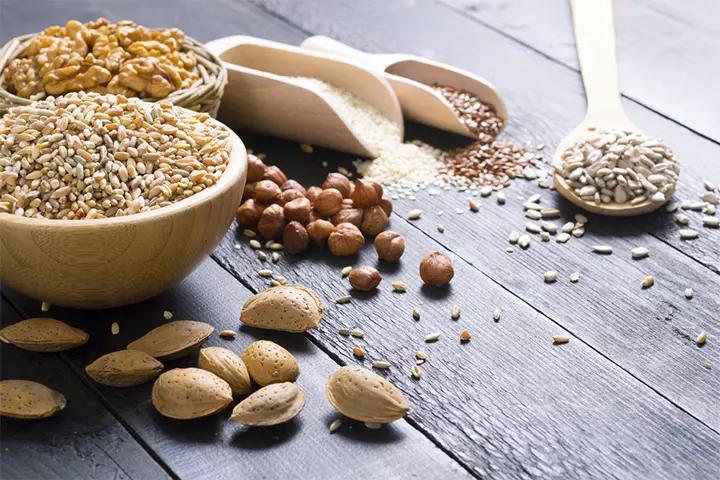
- Eggs and dairy products: Egg yolks tend to have the highest concentration of biotin. Dairy products such as cheese, milk, etc also contain impressive amounts of this vitamin, and can be easily included in the diet.
- Fruits and veggies: Many fresh fruits and vegetables turn out to be excellent sources of biotin. Cauliflower, avocadoes, mushrooms, raspberries, carrots, swiss chard, onions, cucumbers, etc. contain substantial amounts of biotin.
- Legumes: Soybeans, black eyed peas and many other legumes also turn out to be notable sources of biotin.
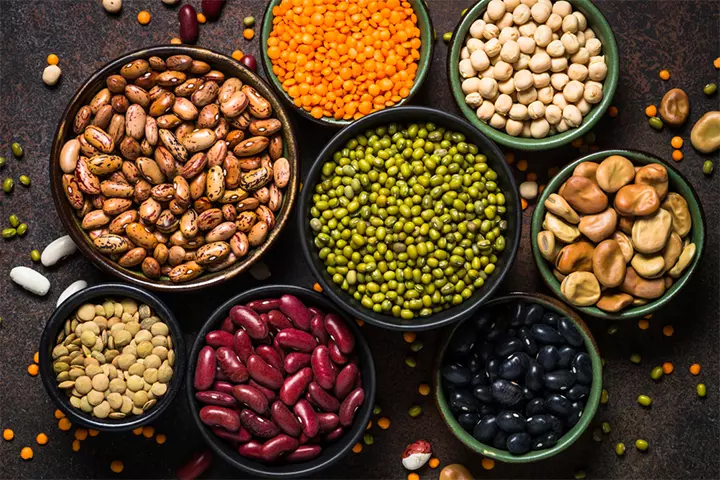
- Meat and fish: Organ meats, salmon and sardines are known to contain the highest levels of this vital nutrient.
Frequently Asked Questions
1. How much biotin is safe during pregnancy?
According to the Institutes of Medicine, daily 30mcg biotin is required for adults, including pregnant women. However, most of the biotin supplement labeling is not strictly regulated, and it can contain huge amounts of biotin than you need (8).
2. What is the richest source of biotin?
Cooked beef liver and cooked eggs have higher quantities of biotin than other food sources (2).
3. What causes biotin deficiency?
Reduction in dietary intake can cause biotin deficiency. It can also be associated with certain metabolic disorders, antibiotic treatments, and inflammatory bowel diseasesiA group of long-term disorders that causes inflammation of the digestive tract. that cause inadequate biotin absorption from the intestines (3).
4. What does biotin do for pregnancy?
Biotin plays a key role in certain enzyme activities and the attachment of proteins in the body, which is essential for a rapidly growing fetus. Issues with protein attachment (biotinylation) can increase the risk for changes in genetic expressions in the fetus (9).
5. Can biotin give you a false negative pregnancy test?
Biotin may affect hCGiA type of hormone secreted during pregnancy. levels in lab analysis. In blood tests, women who take biotin supplements can have false low levels of hCG. This can also give invalid results on home urine pregnancy tests. Higher hCG levels are an early indicator of pregnancy and may also help determine miscarriage and ectopic pregnancy (8). High quantities of biotin may also show false low thyroid stimulating hormone (TSH) levels and troponin levels and interfere with the lab results of cortisol, estrogen, and progesterone levels in blood tests (10).
6. What’s the difference between biotin and prenatal vitamins?
Biotin may not be present in all prenatal vitamin supplements since it can be obtained from dietary sources (10).
7. Can biotin cause birth defects?
Animal studies have also shown birth defects (congenital disability) in babies born to mothers with biotin deficiency. Some research shows that biotin deficiency might be teratogenic to humans. However, more investigations are needed (7).
8. Can too much biotin cause miscarriage?
There is no evidence of toxicities or miscarriage related to excess biotin intake. This may falsely cause high or low laboratory values leading to misdiagnosis and management of medical conditions (2).
Biotin belongs to the B complex vitamins. Insufficient amounts of Vitamin H or Biotin during pregnancy can affect skin health, impede hair growth, and increase the likelihood of developing diabetes and depression.The vitamin is required for proper fetal development as well. Good dietary sources of biotin include milk products, fish, meat, eggs, nuts, black-eyed peas, and vegetables such as cauliflower, cucumber, and carrot. Check with your doctor if you wish to include any supplement for biotin during pregnancy to know the correct dose of the vitamin and avoid spurious products.
Infographic: How To Get More Biotin From Your Pregnancy Diet?
As with other nutrients, getting biotin through your diet is best. Including biotin-rich foods in your pregnancy diet will ensure you are not deficient. The infographic below shows you how to achieve the same by consuming various foods that contain biotin.
Some thing wrong with infographic shortcode. please verify shortcode syntaxIllustration: Can You Take Biotin While Pregnant?
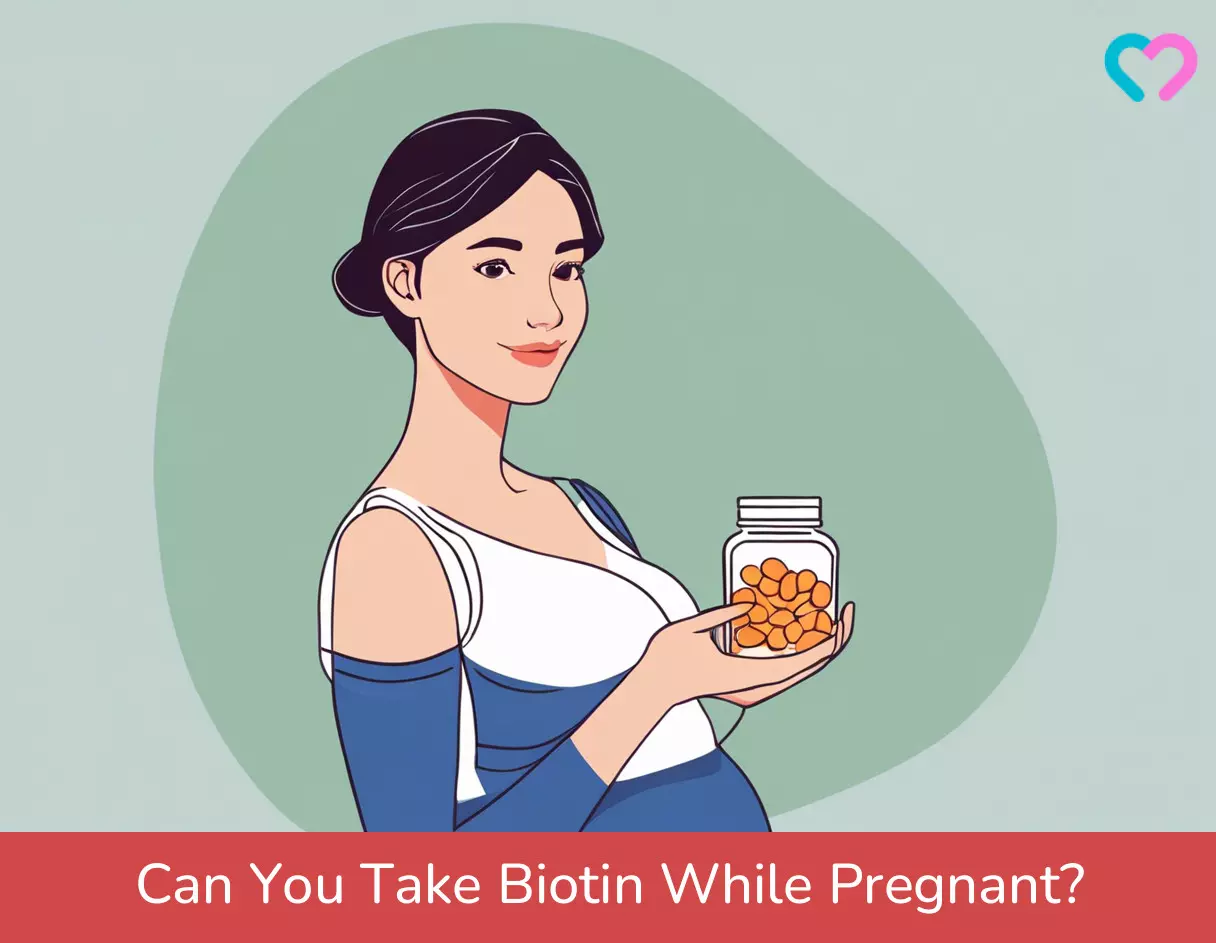
Image: Stable Diffusion/MomJunction Design Team
Discover the wide range of symptoms caused by biotin deficiency, from skin rashes to hair loss, and explore the underlying reasons behind these signs, as well as effective preventive measures.
References
- Vitamin H (Biotin).
https://www.mountsinai.org/health-library/supplement/vitamin-h-biotin - Biotin: Fact Sheet for Health Professionals.
https://ods.od.nih.gov/factsheets/Biotin-HealthProfessional/ - R Rodríguez Meléndez; (2000); Importance of biotin metabolism.
https://pubmed.ncbi.nlm.nih.gov/10846444/ - Importance and benefits of Proteins Vitamins and Minerals In Pregnancy And Lactation.
https://www.fogsi.org/wp-content/uploads/2025/02/macleods-TOG-NPP.pdf - Biotin.
https://lpi.oregonstate.edu/mic/vitamins/biotin - Fatima Saleem and Michael P. Soos; Biotin Deficiency
https://www.ncbi.nlm.nih.gov/books/NBK547751/ - Donald M Mock; (2009); Marginal Biotin Deficiency is Common in Normal Human Pregnancy and Is Highly Teratogenic in Mice.
https://pmc.ncbi.nlm.nih.gov/articles/PMC2646213/ - Biotin and lab tests: Beauty supplement poses risks for pregnant women.
https://utswmed.org/medblog/biotin-risks-postpartum-hair-loss/ - Pregnancy and Lactation.
https://lpi.oregonstate.edu/mic/life-stages/pregnancy-lactation - Prenatal Vitamins & Minerals (Multiple Micronutrient Supplements MMS).
https://vitaminangels.org/our-work/interventions/prenatal-vitamins-and-minerals/
Community Experiences
Join the conversation and become a part of our nurturing community! Share your stories, experiences, and insights to connect with fellow parents.
Read full bio of Dr. Anita Gupta
Read full bio of Ria Saha
Read full bio of Rebecca Malachi
Read full bio of Dr. Joyani Das






